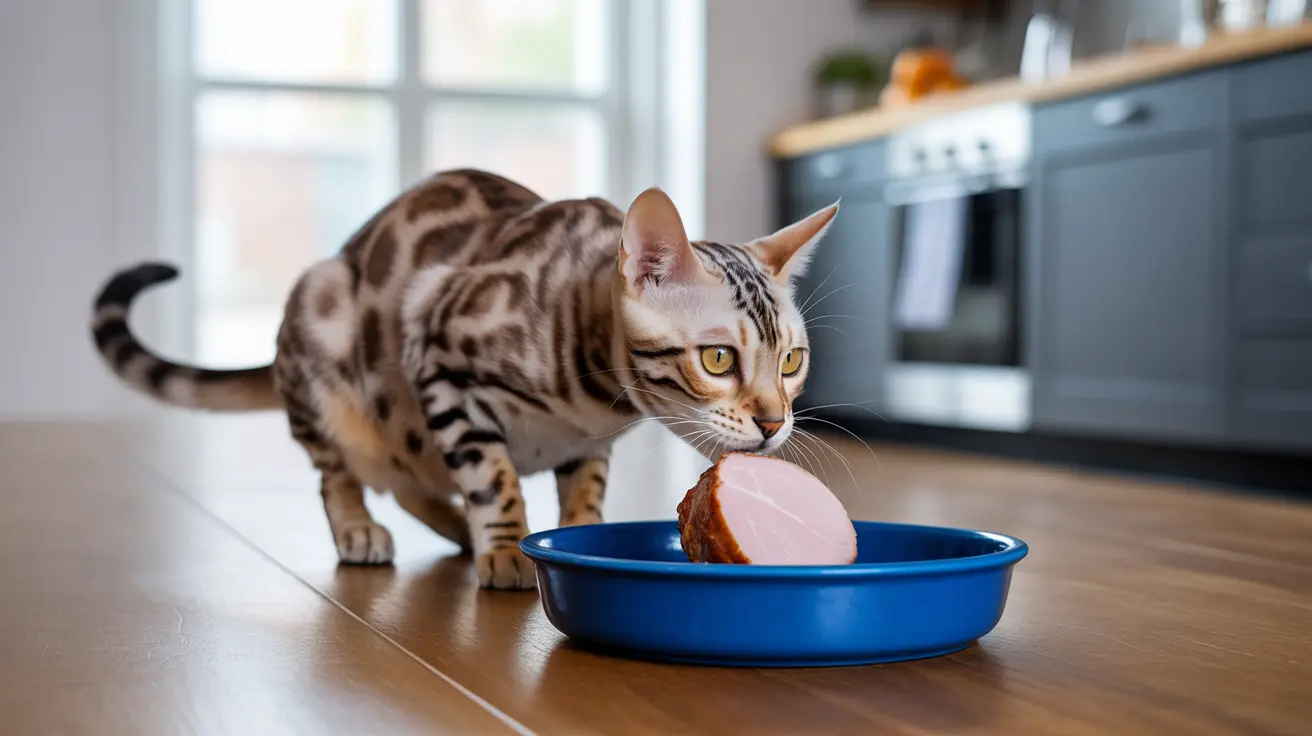As a cat owner, you might wonder if sharing a slice of ham with your feline friend is safe. While cats are natural carnivores and can technically eat ham, there are important considerations and potential risks you need to understand before offering this popular deli meat to your pet.
In this comprehensive guide, we'll explore the safety concerns, nutritional implications, and best practices for feeding ham to cats. We'll also discuss healthier alternatives and warning signs to watch for if your cat does consume ham.
Understanding Ham's Impact on Feline Health
While cats are obligate carnivores requiring meat-based protein, ham isn't an ideal protein source for them. The primary concerns stem from ham's high sodium content, excess fat, and various preservatives used in processing.
Commercial ham typically contains sodium levels far exceeding what's healthy for cats, with some varieties containing up to 1,200mg per 100 grams. This excessive salt content can lead to serious health issues, particularly in cats with existing kidney problems or heart conditions.
Safe Serving Guidelines for Ham
Portion Size and Frequency
If you choose to offer ham to your cat, follow these strict guidelines:
- Limit portions to pea-sized pieces
- Offer no more than once or twice per week
- Only serve plain, cooked ham
- Avoid seasoned or honey-baked varieties
Preparation Requirements
When preparing ham for your cat, ensure it's:
- Thoroughly cooked
- Free from seasonings and glazes
- Cut into small, manageable pieces
- At room temperature before serving
Potential Health Risks and Concerns
Immediate Health Concerns
Feeding ham to cats can lead to several acute health issues:
- Digestive upset and diarrhea
- Vomiting
- Excessive thirst
- Lethargy
Long-term Health Risks
Regular ham consumption may contribute to:
- Obesity
- Pancreatitis
- Kidney problems
- Hypertension
- Salt toxicity
Healthier Alternatives to Ham
Instead of ham, consider these safer protein options for your cat:
- Plain, cooked chicken breast
- Lean turkey meat
- Commercial cat treats
- Veterinary-approved protein supplements
When to Contact Your Veterinarian
Seek immediate veterinary care if your cat shows these symptoms after eating ham:
- Persistent vomiting or diarrhea
- Unusual lethargy
- Excessive thirst or urination
- Loss of appetite
- Unusual behavior changes
Frequently Asked Questions
Can cats safely eat ham, and if so, how much is appropriate as a treat?
Cats can safely eat small amounts of plain, cooked ham as an occasional treat. Limit portions to pea-sized pieces no more than once or twice per week. Never make ham a regular part of your cat's diet.
What types of ham are safe or unsafe to feed to cats?
Plain, cooked ham is safest in tiny amounts. Avoid raw ham, honey-baked ham, smoked ham, and deli meats with added seasonings or preservatives. Never feed ham bones to cats.
Why is ham potentially harmful to cats' health even though it contains protein?
While ham contains protein, its high sodium content, excess fat, and preservatives make it potentially harmful to cats. These components can lead to dehydration, kidney problems, and other health issues.
What are the risks of feeding raw or seasoned ham to cats?
Raw ham can contain harmful bacteria like Salmonella and E. coli. Seasoned ham often contains ingredients toxic to cats, such as garlic and onion, which can cause serious health problems including anemia.
Are there healthier meat alternatives to ham that I can feed my cat as treats?
Yes, better alternatives include plain cooked chicken, turkey, or commercially prepared cat treats. These options provide protein without the risks associated with ham's high sodium and fat content.
Conclusion
While cats can technically eat ham in very small amounts, it's best to err on the side of caution and choose healthier alternatives. The risks associated with ham's high sodium content, preservatives, and fat generally outweigh any potential benefits. Focus instead on providing your cat with a balanced, veterinary-approved diet supplemented with cat-specific treats.






